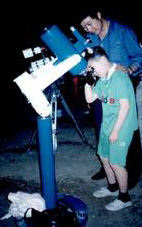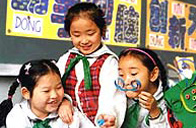 connecting
subjects, environment and activity has gradually come
into being in the environment education of primary and
junior school. The environment education is carried out
not only through textbook but also through a variety of
activity courses so as to cultivate the students' consciousness
of protecting the environment. connecting
subjects, environment and activity has gradually come
into being in the environment education of primary and
junior school. The environment education is carried out
not only through textbook but also through a variety of
activity courses so as to cultivate the students' consciousness
of protecting the environment.
The examples
include that advocating environmental knowledge on the
theme meeting or morning meeting, organizing special research
on environment issues, organizing theme activities like
"Green education activity", "Cherish water
activity", "little environment protecting guard"
on special days like "Day of planting tree",
"World Sanitation Day", "World Environment
Day", and organizing entertainment shows, speech
contest, game shows, watching movies, and other interesting
activities with environment education as the theme. At
the same time, the school also pays great attention on
the environment of schoolyard and educates the students
subtly through the cleaning and beautifying |
|
 the
school environment. the
school environment.
China actively develops the after-class technique activities among juvenile. Since the 1980s, the nationwide juvenile after-class technique activities included Olympic
subject series contests, the juvenile invention
and science essay competition, the juvenile biology
and environment science practice, the juvenile technique
summer camp, and the juvenile science exhibition. In
the year of 1999, the Science Committee of China has
proposed the "2049 Plan".
The Ministry of Education and the Science and Technology
Association have co-advocated, initiated and promoted
a science education reform experiment named "Learning
by doing".
Working skills
is a course name formally established by the Ministry
of Education in 1981, and is a compulsory course of
high school. It plays an important role in the full
execution of quality education in fundamental education
and is praised as a course "creating wisdom with
fingers". The education of working skills consists
of two parts: working ethics and operation skills with
an aim to teach students to use both hands and brain.
The main
|